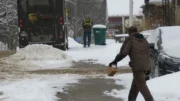Many gardeners stand over their plot proudly this time of the year, basking in the glory of what they accomplished with a spring planting. They are satisfied with their gardens and sometimes even look forward to frost as a way to get a break.
Then there are the rest of us who are spending the shorter days filling every open space with seeds and soon using plants to take the garden well into fall and even winter.
The key is to use seeds of varieties that love cool temperatures and will be ready to harvest before things get really cold. Some will actually winter-over with the help of protection.
One of the easiest seeds to start right now is lettuce. There are hundreds of different varieties, and all of them will be happy being sowed now. Harvesting starts in just a few weeks, just in time for the deluge of tomatoes that will finally be ripe. “Black Seeded Simpson” is probably the most popular, but look around at your local nursery for something different. There are even blends of lettuce in one packet, with some spicy and others mild.
Arugula is another simple seed to plant right now. It grows like a weed and will persist in the cold into December. “Wild Rocket” is actually a weed in Italy, but a tasty one. All arugula has a spicy, peppery flavor.
There are two different greens I love to plant now: kale and something called tatsoi. “Red Russian” kale is easy to find and will grow into winter. The vegetable sweetens after a frost, turning starches into sugar. I sauté the leaves with garlic. The tatsoi is from the same family but produces a rosette of deep green leaves all winter long. It has a mild flavor, is really good for you and can be thrown into any salad (the kids will never know the difference).
Kohlrabi is one of the veggies that seems to be for gardeners only. It’s from the cabbage family and forms a tennis ball-sized growth on top of the soil. Its mild flavor has been treasured by growers for decades.
Corn mache is the ultimate cold weather green. It can freeze solid and still be good after a thaw. It’s easy to grow from seed, too.
Radishes are planted the first thing in the spring and then again for a fall crop. Because they prefer cooler weather, they will head up better as fall arrives.
Other root crops like beets, turnips and the oft-misunderstood rutabaga also can all be planted now. They can be left in the soil under a thick layer of straw and harvested during a thaw. The beets won’t be as good as the summer crop, but they’ll be better than anything you’ll find in a grocery store. Turnips and rutabagas get a bad rap but can be used many ways in the kitchen. Like kale, they sweeten up after a hard frost.
There are lots of other seeds to sow, too. Things like Swiss chard, bunching onions, collards, mustard greens, spinach, and a host of others.
Any seedbed should be improved with compost. It provides everything the seeds will need to reach maturity. I just buy a bag or two at my local nursery and spread it a few inches deep over the planting area. Sprinkle the seeds on the compost and then just scratch them in and water. Keep the soil moist until the seeds sprout. Most will need to be thinned, so just use the little seedlings in salads or nibble on them raw in the garden.
Soon garden centers will offer a new round of cold weather plants. It’s a quick way to add plants to the garden. By the way, you don’t want anything that’s been sitting around since the spring.
Just a reminder most of these seeds can be grown in containers, too. Give each variety enough room to have the space it needs, especially the root crops.
When winter is looming, the plants can be covered with a floating row cover. It’s a spun-bound translucent fabric that acts as a greenhouse. It’s easy to find at any nursery, and it is inexpensive and can be used year after year.
Planting now will extend the garden season well into winter. Get some seeds in the ground and then rest when the snow is on the ground. Even then you might be able to stand proudly over your garden, knowing there’s plenty of homegrown produce waiting for the picking.
Doug Oster is editor of Everybody Gardens, a website operated by 535Media, LLC. Reach him at (412) 965-3278 or doster@535mediallc.com. See other stories, videos, blogs, tips and more at EverybodyGardens.com.




































